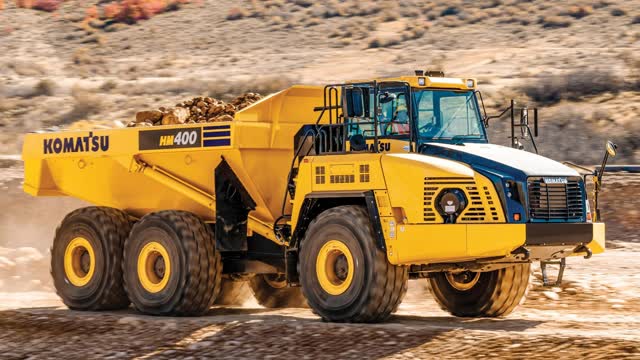

Komatsu HM300/400 Pre-Operation Guide
This guide covers the essential steps for conducting a pre-operation inspection on Komatsu HM300 and HM400-3/Dash 5 articulated haul trucks. Follow these steps to ensure your machine is free from damage, wear, and leaks, maximizing its longevity and productivity.
This guide covers the essential steps for conducting a pre-operation inspection on Komatsu HM300 and HM400-3/Dash 5 articulated haul trucks. Follow these steps to ensure your machine is free from damage, wear, and leaks, maximizing its longevity and productivity.
1
Approach the Machine
Ensure Safety Before Inspection
- Ensure there is no one in the cab.
- Confirm the machine is securely chocked against movement.
2
Battery Check
Inspect the Batteries
- Check that batteries are securely in place.
- Ensure connection points have no excessive corrosion.
- Locate breakers and the main battery disconnect switch.
3
Wheel and Fluid Check
Inspect Wheels and Fluids
- Inspect tires and wheels for damage.
- Check wheel hardware to ensure all lugs are tight.
- Verify hydraulic fluid levels using the sight glass.
4
Rear Cab Inspection
Inspect Rear Cab Area
- Start at the top and work down.
- Check the guarding, brackets, and bolts.
- Inspect hydraulic lines for leaks.
- Check cylinder and articulation joint pins and lubrication.
- Look under the machine for leaks.
- Check transmission and brake fluid levels and fill spots.
5
Lift Cylinder and Brake Housing
Inspect Lift Cylinder and Brake Housing
- Inspect lift cylinder mounting spot and hydraulic lines.
- Check brake housing for leaks.
6
Mud Flap and Bed Shims
Inspect Mud Flap and Bed Shims
- Check mud flap condition.
- Ensure bed shims are in place.
7
Tailgate and Wheel Inspection
Inspect Tailgate and Wheels
- Inspect tailgate hardware if equipped.
- Perform the same wheel inspection as before.
8
Rear Machine Inspection
Inspect Rear of Machine
- Check underside of the bed for material buildup.
- Inspect bed hinge pins, lights, and rearview camera.
- Check wheels, axle, and cylinders for leaks.
- Inspect linkage for any issues.
9
Right Side Inspection
Inspect Right Side of Machine
- Perform the same inspection as the left side.
- Check handrails and mounting points on the cab.
10
Fuel and DEF Tank
Inspect Fuel and DEF Tank
- Locate fuel fill spot for ultra-low sulfur diesel.
- Check DEF tank (blue cap) and sight tube for DEF levels.
- Inspect sediment drain for the fuel tank.
11
Front Machine Inspection
Inspect Front of Machine
- Inspect mirrors and handrails on the right side of the cab.
- Check air filter latches and air restriction gauge.
- Inspect lights, handrails, mirrors, and radiators.
- Look underneath the front for leaks.
12
Cab and Engine Inspection
Inspect Cab and Engine
- Check handrails and mounting spots.
- Use proper mounting and dismounting techniques.
- Open the hood for engine inspection.
13
Engine Check
Perform Engine Inspection
- Perform a visual inspection of the engine for leaks or debris.
- Check windshield wiper fluid and engine coolant levels.
- Inspect fuel pre-filter for contamination.
- Locate and check the engine oil dipstick.
- Inspect fan and belts for wear or damage.
14
Final Steps
Complete Final Inspections
- Close the hood.
- Check the hydraulic fill spot.
- Inspect the exterior cab filter.
15
Ready for Operation
Enter the Cab and Operate
- If all inspections are satisfactory, enter the cab and operate the machine.